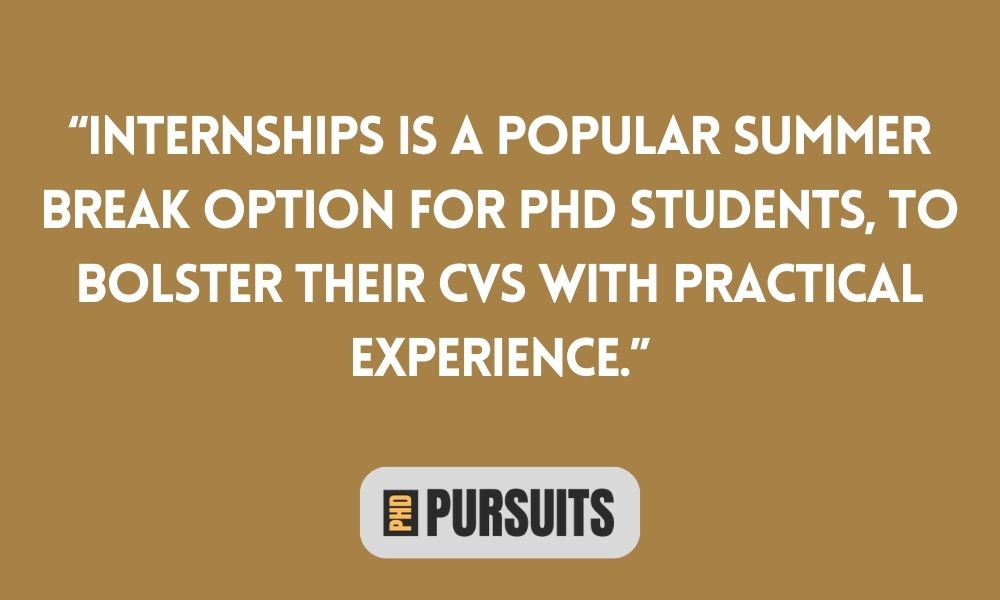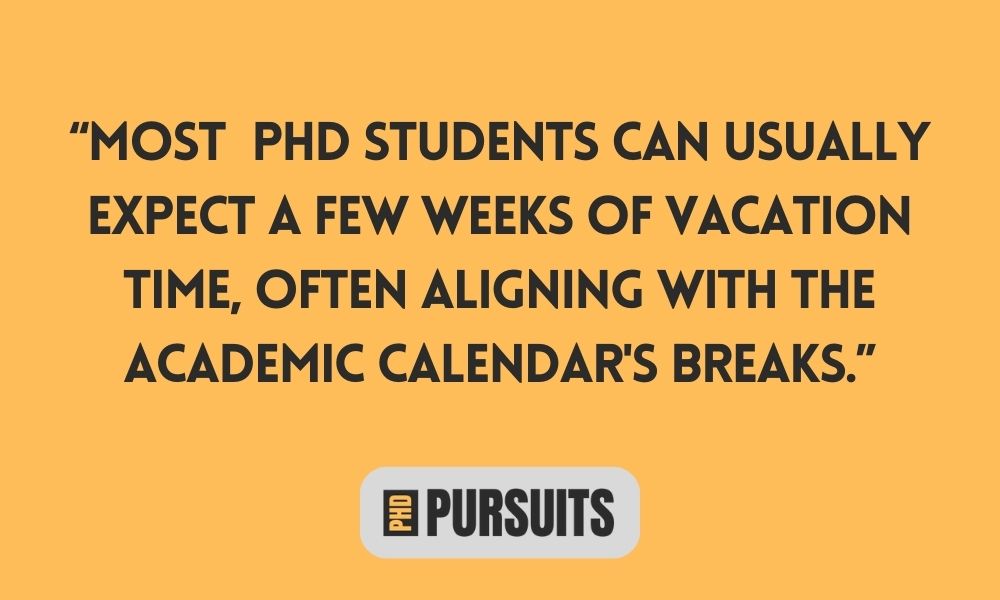If you are thinking about studying for a PhD, you may wonder if the academic year works like your undergraduate of master’s days. Do PhD students get summers off?
In general, PhD students do not get a set summer break. Instead, they are free to arrange their breaks as they see fit. Many use the summer holidays to focus on research or other related work, as they do not have to deal with other responsibilities such as coursework.
In this post, we explore if PhD students get summers off, and when do they actually take breaks. Let’s go.
Do PhD Students Get Summers Off?
Unlike undergraduate students, who often enjoy a clear break, the life of a PhD student during these warmer months is less straightforward. Many PhD candidates find that summer is not a time to relax but to dive deeper into their research or take on additional responsibilities.
For starters, PhD programs in fields like biomedical sciences or humanities don’t shut down when the semester ends.
Students usually continue working on their research, striving to get their findings published or to reach the next milestone in their dissertation.
Summer offers a unique stretch of uninterrupted time to focus on these tasks without the distraction of coursework.
Some grad students choose to teach summer classes or work as TAs, which is both a way to gain teaching experience and a necessity for getting paid during the less structured summer months. These opportunities are crucial for maintaining a stipend and funding for their doctoral degree.
Internships present another popular summer option, especially for those looking to bolster their CVs with practical experience.

Such stints can be particularly beneficial for professional development, offering insights and connections that are invaluable for post-graduation prospects.
However, it’s not all work. The academic calendar does typically include a few weeks of vacation, often around:
- Christmas,
- Easter, and
- sometimes during the summer.
Students must be proactive in discussing summer plans with their advisors or supervisors, as expectations can vary greatly. Some advisors encourage taking time to recharge, seeing it as essential for maintaining a healthy work-life balance.
Do PhD Students Have Annual Leave?
When it comes to the concept of annual leave, the life of a PhD student often deviates from the norm.
Unlike jobs in the corporate world, where the number of vacation days is clearly stipulated, PhD candidates find themselves in a more fluid situation.
You might wonder, “Do I get to take a break?” The answer isn’t straightforward and varies significantly across different programs and disciplines.
In many PhD programs, especially those focused on research in areas like biomedical sciences or social sciences, the expectation is to work year-round. This includes the summer months, when students might double down on their:
- research work,
- teach summer classes, or
- take on internships to bolster their CV.
However, this doesn’t mean PhD students don’t get days off. Most grad students can usually expect a few weeks of vacation time, often aligning with the academic calendar’s breaks, like Christmas, Easter, and sometimes spring break.

Yet, these “days off” are less about strict entitlements and more about what you and your advisor agree upon.
It’s common for PhD students to discuss and plan their vacation time with their supervisor, ensuring it doesn’t conflict with major milestones or deadlines in their research.
For instance, if you’re planning to attend conferences or need time to visit family, you’ll often need to coordinate these breaks in advance. It’s about finding a balance between meeting the demands of your PhD program and taking time to recharge.
How PhD Students Commonly Spend Their Summers
Summer for PhD students isn’t quite the break you might imagine. Instead, it’s a pivotal time often packed with activities that contribute to their doctoral journey.
How these students spend their summers can vary widely, reflecting the diverse nature of PhD programs and individual goals.
Research
Many PhD candidates use the summer months to focus intensively on their research. With coursework often taking a backseat, it’s a prime time to:
- collect data,
- conduct experiments, or
- delve into literature reviews.
For those in fields like the biomedical sciences or humanities, uninterrupted research time is crucial for making significant progress on their dissertations.
Teaching
Teaching responsibilities don’t necessarily pause when the semester ends. Some grad students teach summer classes or work as teaching assistants (TAs).
This not only helps with getting paid during the summer but also provides valuable teaching experience. It’s a win-win situation, contributing to both their professional development and stipend continuity.
Internship
Internships are another common summer pursuit, especially for those looking to apply their research in an industry setting. They spend time working in companies, laboratories, or factories.
These opportunities can enhance a PhD student’s CV, offering practical experience and networking opportunities that are invaluable for future career prospects.
Attend Conferences & Workshops
Yet, it’s not all work. Summer is also a great time for PhD students to attend conferences and workshops. These gatherings are vital for:
- presenting research,
- getting feedback, and
- networking with peers and leaders in their fields.
Taking Some Time Off
Despite these commitments, taking some time off is also on the agenda for many.
PhD students often coordinate with their advisors to plan a week or two of vacation. This break is essential for recharging and maintaining a healthy work-life balance.
Visiting family, exploring new places, or simply taking time to relax can provide the necessary respite from the demands of grad school.
When Should You Take Leave As A PhD Student?
With no fixed vacation times like in undergraduate studies, you’re left to judge the best moments to step back. The rhythm of a PhD program, with its ebbs and flows of intensity, dictates unique opportunities for breaks.
After Major Milestones
You might consider taking leave after completing major milestones. This could be after:
- submitting a dissertation chapter,
- finishing a significant part of your research, or
- passing qualifying exams.
These achievements often mark natural pauses in your workload, offering a chance to recharge before the next push.
Summer
Summer is a common time for PhD students to take a break, albeit a brief one. Despite the ongoing research work, many find it easier to step away for a week or two when the academic pace slightly slows.
Summer is also a period when advisors might be more amenable to breaks, understanding the need for students to recharge.
Take some time off, and enjoy the fine weather. Go hiking, biking, or ride a bike accross the country with your friends, and forget about your PhD for a bit. You can always come back to it later.
Celebrations & Holidays
Christmas and Easter breaks align with the academic calendar’s built-in pauses, making them convenient times for PhD students to take leave. These periods can offer a respite without disrupting the flow of research too much.
If you celebrate other cultural holidays, such as Eid, Chinese New Year, or Divali, you should also take leave from your studies and enjoy your time with your friends and family too.
Me-Time
PhD candidates should also consider personal needs and life events when planning leave. Attending to your well-being, seeing family, or simply taking time for yourself are valid reasons to pause your academic pursuits.
Sometimes, things get overwhelming in your personal life. Your child could be sick, or that you spent too much time on your thesis you are simply burned out.
In situations like this, take leave and manage them first.

Remember, communication with your advisor is key. Discussing your plans can help align expectations and ensure you’re taking leave at a time that works for everyone involved. Balancing the intense demands of a PhD program with the need for rest is crucial for maintaining a sustainable work-life balance.
Life Of A PhD Student – Not Like Your Bachelor’s Degree Days
Summer break is rather different in the world of PhD students, blending research, professional development, and occasional rest. These dedicated scholars often forgo traditional breaks, choosing instead to advance their academic pursuits.
Yet, within this rigorous schedule, there lies a tailored flexibility, allowing for moments of recharge essential for sustaining the marathon towards a doctoral degree.
Understanding this balance provides insight into the resilient and adaptable nature of those on the journey to academic excellence.

Dr. JW Ong holds academic degrees, including a Ph.D. in Applied Linguistics from universities in New Zealand, Malaysia, and the UK. He started PhDPursuits.com as a way to share the experience he wish he would have had known before embarking on his PhD.

